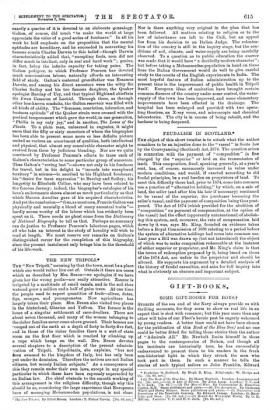THE NEW TRIPOLI.*
THE "New Tripoli," meaning by that the town, must be a place which one would rather live out of. Outside it there are oases which as described by Mrs. Braun—we apologize if we have given her the wrong prefix—are really attractive. Za.nzur is irrigated by a multitude of small canals, and in the soil thus watered grow a million and a half of palm trees. At one time the people used to export quantities of fruit—olives, dates, figs, oranges, and pomegranates. Now agriculture has largely taken their place. Mrs. Braun also visited two places in the hinterland, Gharian and Yeffron. The former is the home of a singular settlement of cave-dwellers. There are about seven thousand, and many of the women belonging to the richer families never come above ground. Their houses are -cooped out of the earth at a depth of forty to forty-five feet, and in those of the richer families there is a sort of state room on the first floor which is reached by climbing up a rope which hangs on the wall. Mrs. Braun devotes several chapters to a description of the present adminis- tration of Tripoli. Tripolitania, she explains, "has not seen annezed to the kingdom a Italy, but has only been put under its dominion. Therefore the natives are not Italian citizens, but merely Italian subjects." As a consequence of t his they remain under their own laws, except in any special particular in which these have been expressly superseded by an Italian law. The chief obstacle to the smooth working of this arrangement is the religions dillculty, though why this should be so, considering the large experience that Europeans have of managing Mohammedan populations, is not clear.
• Ts, New Triooa. By Ethel Braun. London: T. Fisher Unwin. [10s. 6d. net.]
Nor is there anything very original in the plan that has been followed. All matters relating to religion or to the law of inheritenee are left to the Cadi, but an appeal lies from his decision to an Italian Judge. The coloniza- tion of the country is still in the inquiry stage, but the con- ditions of soil, climate, and water-supply are being carefully observed. To a question as to public education the answer was made that it would have" a decidedly modern character"; but before taking a Mohammedan population in band on these lines the Italian Government would do well to give careful study to the results of the English experiments in India. The most hopeful feature of Italian administration up to the present time is the improvement of public health in Tripoli itself. European ideas of sanitation have brought certain common diseases of the country under some control, the water- supply of the town has been improved, and some elementary improvements have been effected in the drainage. The hospital has been enlarged and provided with two opera- ting theatres, an X-ray room, and microscopic and chemical laboratories. The city is in course of being rebuilt, and the harbour is being deepened.














































 Previous page
Previous page